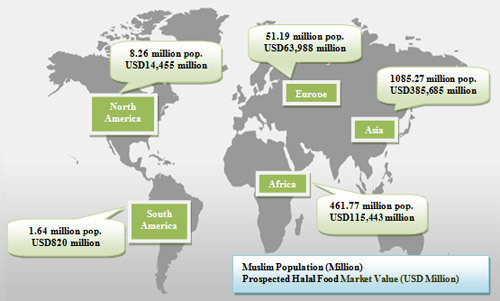
By: Mohamed El-Mouelhy
It is estimated that the world’s Halal food trade averages nearly US$150 billion per year. The existence of such a big market naturally opens the doors of economic opportunities for these engaged in the business, directly or indirectly.
From the marketing point of view a crucial factor is the concept of ‘Market’. Traditionally market is considered to be a place where buyers and sellers engage in buying and selling of goods and services. In its practical sense a market may also exist when buyers and sellers interact without ever being at a common geographical location. In principle market is a mechanism under which the buyers are willing to buy a product and the sellers are willing to sell it. In its operational form, market is based on interaction between the preferences of buyers and the ability and willingness of suppliers to sell and deliver the product according to tastes and preferences of the buyers.
A successful seller is not always the one who produces exactly the same as of others, but the one who, while producing the same product lines, can cater to the special tastes, preferences and needs of a group of customers which other producers have failed to meet.
Halal food market exists wherever there are Muslim consumers whose tastes and preferences are governed by Halal rules on food specification. Halal food may apparently be the same as other food, but its nature, technique of its processing involving the ingredients, handling, use of various methods from the beginning to the end, is always the one approved and recommended by Islamic law.
The Halal food trade presents the following challenges:
- 1- Attitude of the suppliers of Halal food products.
- 2- Increasing the volume of sales.
- 3- Efficient distribution network.
- 4- Advertising.
- 5- Creating consumer loyalty.
1- ATTITUDE OF THE SUPPLIERS
When a Muslim consumer buys a Halal product, he is doing so because of his commitment to Islamic principles and teachings. This does not mean that the seller should develop a patronising attitude towards the buyers. By patronising attitude it is meant the attitude by the producers of Halal food that they are doing a favour to the Muslim consumers by supplying Halal food, without which the consumers lives will remain hard and dry as they will not be able to enjoy the product. Such an attitude that takes the consumer as weak because he is bound to purchase the Halal food in order to avoid the Hellfire, makes the seller arrogant and careless, and may result in the loss of market, forever. This will happen because a seller practising patronising attitude would ignore the tastes and preferences of the buyers, and will fail to improve the quality of the product and adopt cost effective methods of production that would enable him to give a competitive price to the consumer.
The patronising attitude is a very real possibility and has affected the Halal Food Trade between many countries. For example some of the high income oil rich Muslim countries used to import poultry, meat and dairy products from some of the fellow Muslim countries that were rich in agriculture and cattle. The exporters of those Muslim countries took the importers for granted and on occasions failed to either maintain quality or meet various other commitments that they had made. This resulted in problems for the importers. The exporters who, despite complaints, did not do much to improve the situation; lost the trust of the buyers and they started looking for other sources of supply.
This failure of Muslim exporters of Halal food products to recognise that the consumer is the final arbiter led the consumers to those suppliers who strongly believe in the consumer as king. Thus in Europe suppliers were located, who were non-Muslims and had neither heard of nor eaten Halal food in their entire life, but they knew the golden rule of marketing, namely: The consumer is king in the market!
Today in many Muslim countries, poultry, meat, dairy products and other foods are imported from Europe, Australia, New Zealand, America, etc.; and the importing countries are happy because they are not only getting Halal food but also high quality food.
Thus from the marketing point of view, the first issue in the Halal food trade, is the issue of the exporter’s psychology and his recognition of the golden rule of marketing without which any attempt to promote Halal food exports to Muslim countries are doomed to fail.
2- INCREASING THE VOLUME OF SALES
In the West, beer manufacturers sponsor and promote sporting events. The spectators watching the sport in the field go there to have the so called “Good Time”; and the same is true for those watching the event on TV at home. Since the western idea of a good time is associated with drinking alcoholic beverages, this is what exactly happens. Those watching the game in the stadium or on TV end up drinking heavily, hence increasing the sale of beer and other alcoholic beverages. The producers of Halal food can take the cue from this relationship and sponsor activities that would raise the level of Islamic consciousness of the people, eventually contributing to increase in the demand for their particular product!
3- EFFICIENT DISTRIBUTION NETWORK
From the producer’s point of view, there are two types of markets for Halal food:
- a- The Market in non Muslim countries.
- b- The Markets in the Muslim countries.
In the case of the non Muslim countries the problem is serious because the Muslim communities are scattered. Thus it is difficult to distribute through dealers because in many cases there are no dealers but only the scattered small retailers. The labour cost is so high that the price will become uncompetitive compared to the same product that lacks Halal attributes. Despite these difficulties one cannot discount the big potential of Halal food market. The answer is to make the product Halal in the first place and make it available for all. Also to take part in exhibitions and conferences of the Muslim Communities in the various big centres.
The real issues in the Muslim countries markets are:
- a- Honouring the commitments on a regular basis.
- b- Maintaining quality.
- c- In dealing with the local distributors it is important to know their culture, their expectations and their way of saying ‘Yes’ and No’. One should also be ready to learn how things can be made to move in that culture.
4- ADVERTISING
Advertising is the key to marketing and sales. From the Halal point of advertising, strategy depends upon whether a particular market is comprehensive Muslim majority or it is a mix of so many different communities.
In an absolute Muslim Majority case where the total presence of non-Muslims is only marginal, it is appropriate to emphasise the Halal nature and characteristics of the food so that it attracts the common folks in the society who are a majority.
In a multi-religious society where Muslims are a significant proportion of the population the product can be marked as Halal on the label so that the members of the community are aware of its status as well as promoting the product in the Muslim and ethnic media.
5- CREATING CONSUMER LOYALTY
Muslim consumers become loyal when:
- a- They always get the product they want.
- b- The supplier has kept his promise.
- c- The Halal nature of the product is beyond doubt, and some respectable authority stands behind the claims of the producer.


